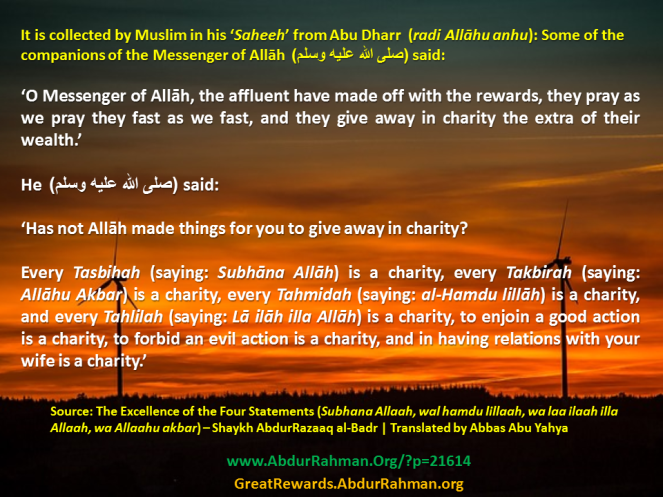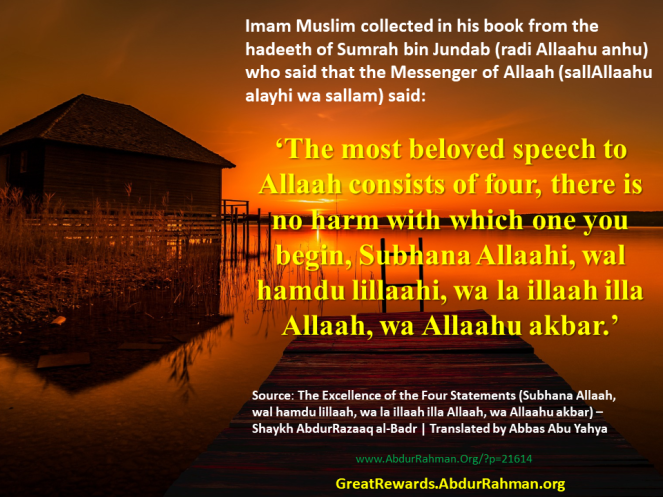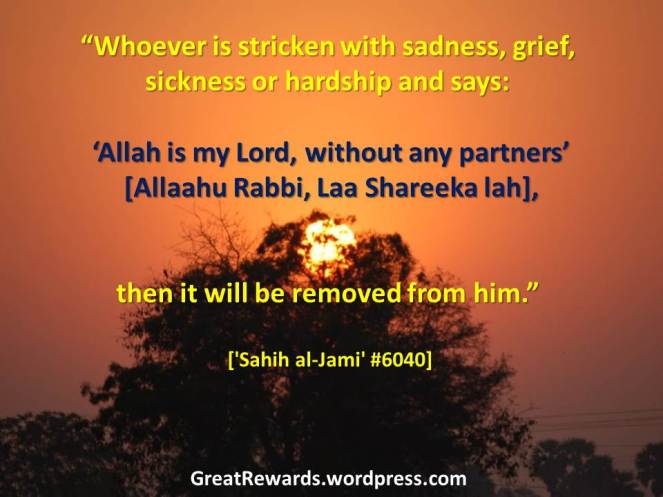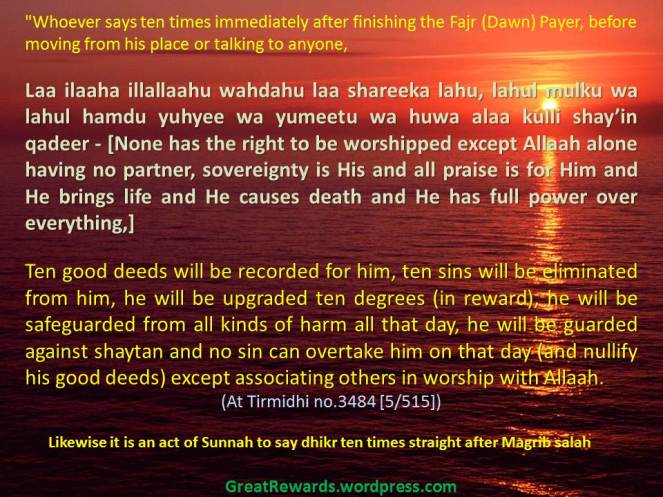11- From the excellence of these words is that for the slave of Allaah they are Sadaqah (giving charity) when he says each one of them.
It is collected by Muslim in his ‘Saheeh’ from Abu Dharr –Radi Allaahu anhu: Some of the companions of the Messenger of Allaah –sallAllaahu alayhi wa sallam– said:
‘O Messenger of Allaah, the affluent have made off with the rewards, they pray as we pray they fast as we fast, and they give away in charity the extra of their wealth.’
He –sallAllaahu alayhi wa sallam– said:
‘Has not Allah made things for you to give away in charity?
Every Tasbihah (saying: Subhana Allaah) is a charity, every Takbirah (saying: Allaahu Akbar) is a charity, every Tahmidah (saying: al-Hamdu lillaah) is a charity, and every Tahlilah (saying: la illaah ila Allaah) is a charity, to enjoin a good action is a charity, to forbid an evil action is a charity, and in having relations with your wife is a charity.’
They said: ‘O Messenger of Allah, when one of us fulfils his desire (with his wife) will he have some reward for that?’
He –sallAllaahu alayhi wa sallam– said:
‘Do you not think that if he were to act upon it unlawfully he would be sinning? Likewise, if he has acted upon it lawfully he will have a reward.’ [Saheeh Muslim]
The poor people thought that there was no Sadaqah except by giving money, and they were incapable of doing that, so the Prophet –sallAllaahu alayhi wa sallam–informed them that all types of good actions and being good is Sadaqah, and the Prophet –sallAllaahu alayhi wa sallam– mentioned that at the head of good actions are these four statements ‘Far is Allaah from imperfection, and all praise be to Allaah, and there is none worthy of worship in truth except Allaah, and Allaah is the Greatest,’ (Subhana Allaahi, wal hamdu lillaahi, wa la illaah ila Allaah, wa Allaahu Akbar).
Source: The Excellence of the Four Statements (Subhana Allaah, wal hamdu lillaah, wa laa ilaah illa Allaah, wa Allaahu akbar) – Shaykh AbdurRazaaq al-Badr | Translated by Abbas Abu Yahya.
Read the full article @ www.AbdurRahman.Org/?p=21614


![In the ‘Musnad’ of Imam Ahmad and Sunnan Ibn Majah and ‘al-Mustadrak’ by al-Hakim from Nu’man bin Basheer –Radi Allaahu anhu– who said: the Messenger of Allaah –sallAllaahu alayhi wa sallam– said: ‘Indeed what you remember/mention from the magnificence of Allaah is saying Subhana Allaah, Allaahu Akbar, la illaah ila Allaah and Alhamdulillaah, it curves around the ‘Arsh, they have a buzzing sound like the buzz of the bee, which (mention / remember) its (companion / the one) who says it. Does not one of you want that, or wish that someone still remembers you by it.’ Al-Busseeri said in: ‘Zawaid Sunnan Ibn Majah: ‘Its Isnaad is Saheeh, its narrators of trustworthy, and it was authenticated by al-Hakim. [Al-Musnad, Sunnan Ibn Majah & al-Mustadrak]](https://greatrewards.files.wordpress.com/2018/06/they-make-a-curve-around-the-e28098arsh-of-ar-rahman-and-they-have-a-buzzing-sound-like-the-buzzing-of-the-bee.png?w=663&h=497)






You must be logged in to post a comment.